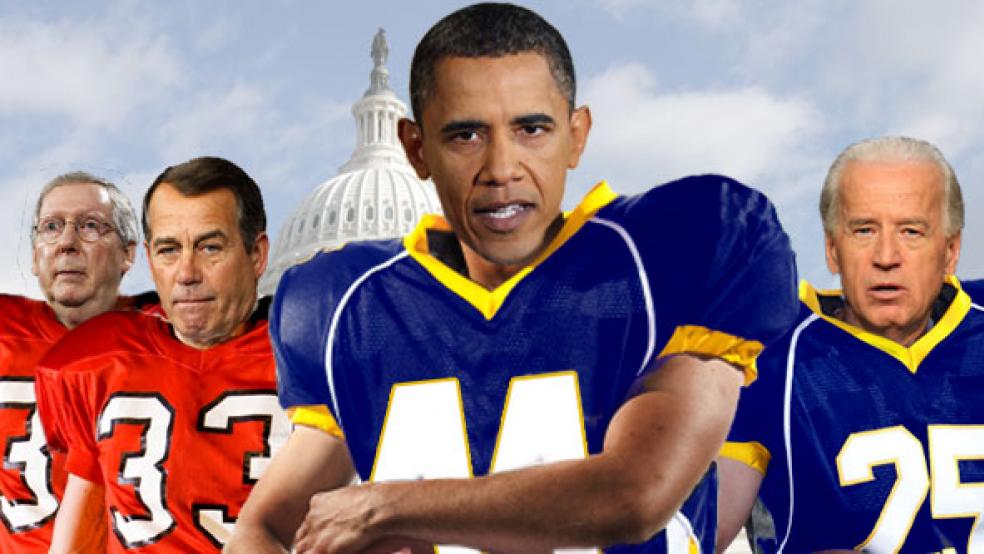About two weeks ago, a CBS News poll reported what we’ve heard before--most Republicans are unhappy with their Presidential choices. But the bigger story is that much of the country feels that way about our leaders as a whole—a poll last fall found that 89 percent of us don’t trust our government to do the right thing.
That disenchantment with politics couldn’t be more different from our passion for pro football. Thirty-eight million people watched the president’s State of the Union speech on Tuesday. Almost triple that number will take in the 2012 Super Bowl on February 5. And while 45 percent of respondents to a 2010 Pew Research Center poll said they keep up with the news, 55 percent said in a Harris poll last fall that they follow the NFL (an all-time high).
Satisfaction with our democracy and our national game are headed in opposite directions, and it’s not because of the individuals involved. America’s sport thumps our leaders in popularity contests for at least three reasons, and all have to do with systems, not people.
First, the NFL moves fast to fix rules that aren’t working—the league doesn’t behave as though its 1966 founders had an omniscient vision for the future of the game. So in the 1970s when defenses were dominating and scoring hit a 36-year low, NFL owners voted to restrict defenders from bumping a receiver beyond five yards from scrimmage and allow offensive lineman to block with arms extended. Scoring went up immediately, along with fan interest—the television audience for the Super Bowl jumped almost 30 percent from 1977 to 1978. By 1981, the league’s television ratings were the highest in league history.
Contrast that with our policymaking—we’re stymied on most big issues, chiefly because of the much-abused Senate filibuster. Almost everyone agrees that we needed immigration reform five or ten years ago, but it’s hard to see how we’ll get it this year or in the next 10 if a 60-vote supermajority is required. Even when big-idea legislation squeaks past a filibuster, it’s so stuffed with giveaways to get vote numbers 58, 59, and 60 that it’s an easy target (see Obama’s health care law). Voters are frustrated not so much with polarization as the fact that rarely do either conservative or liberal ideas actually get tested—69 percent of respondents to a CNN poll in October said that Congress did nothing to address the country’s problems last year.
Second, the NFL’s parity system attracts buy-in from an ever-larger fan base by letting new talent take center stage every year. Bill Maher gets laughs for suggesting that the NFL’s revenue-sharing arrangement is socialist. Funny but not really true--the league levels opportunity, not outcomes—losing teams aren’t given a pass to the playoffs. Instead, the parity trifecta of revenue sharing, team salary caps, and a reverse draft order based on where teams finished the previous year ensure that a team’s fortunes rise and fall with the talent of its front office and coaching staff rather than how much money they have to spend on players (see: Major League Baseball). Every year since 2000, five new NFL teams have made the playoffs; that’s five markets every year where fan interest in the hometown club revives.
But in the rest of the country, we’re going backward on equal opportunity. Average people think of themselves as living in a different country from the elite (who are also increasingly their politicians, according to a December report by the Washington Post). The America where anyone can get ahead by working hard is increasingly elusive—people actually move up or down the income ladder far less often than in most other rich countries, according to a 2007 Pew Charitable Trusts report. There are well-documented ways to bring NFL-style parity to the country that don’t involve spreading the wealth around—like equalizing the money available for public education across school districts, offering more tax incentives for poor families to save, or giving more college financial aid to low-income students.
Third, the NFL’s front office takes care that those administering its 244-page rulebook aren’t perceived as being in someone’s pocket. When was the last time you heard of an NFL referee working a game in which one team was the ref’s former employer? How about an official taking a hunting trip with a coach? You haven’t because those would violate the league’s conflict-of-interest guidelines.
Not so at the Supreme Court, where Justices make their own (often curious) recusal decisions with no oversight from anyone. So Justice Elena Kagan, who was solicitor general in the Obama administration when the President signed the health care law, will sit in judgment of said law this summer. And famously, Justice Scalia took a duck-hunting trip with Vice-President Cheney in 2004 during a period when an important case involving a Bush administration energy task force was pending before the court. Stories like those might have something to do with the 78 percent of respondents to an AP poll last August who said they think the Justices sometimes let their own partisan political views influence their decisions.
The NFL’s replay rule is instructive here—in 1986, the league became the first pro sport to use instant replay to review close calls, even at the cost of slowing down the game. Sixty-six percent of fans approved of the replay rule when the league first adopted it, and the replay process has only gotten better since then. House Democrat Chris Murphy is trying to bring something like instant replay to the Court’s recusal decisions. Last March, he introduced a bill to require the Justices to disclose their reasoning when they don’t disqualify themselves in questionable cases and to force the Court to come up with a process for reviewing those decisions. It’s a start.
It’s fourth-and-long, and our gridlocked country needs a new playbook. To fix America’s politics, we might start by taking lessons from one institution that’s always working to make itself better.




